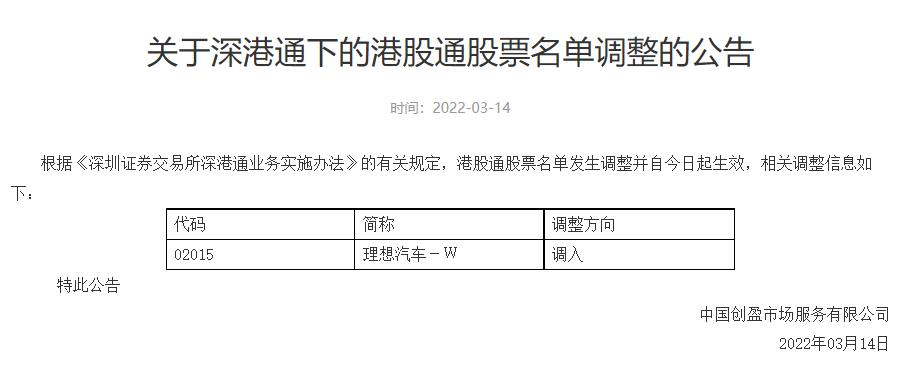With the inclusion in the list, investors in the Chinese mainland will be able to trade Li Auto shares more easily.
Li Auto's shares traded in Hong Kong are included in a mechanism that connects the Hong Kong and mainland stock markets, thus allowing mainland Chinese investors to trade them.
The Shenzhen Stock Exchange announced today that it has adjusted the list of Shenzhen-Hong Kong Stock Connect stocks to include Li Auto's Hong Kong-traded shares, effective today.

The mechanism was launched in November 2014 to facilitate investors from Hong Kong and the mainland to buy each other's stocks.
With access to the list, investors in the Chinese mainland will be able to trade Hong Kong stocks more easily, although only investors with securities account assets of more than RMB 500,000 will be eligible to participate in the mechanism.
The program consists of two channels, Shenzhen and Shanghai, which operate independently. Hong Kong stocks bought by investors using a Shenzhen account can only be sold through that account, and the same is true for Shanghai.
Li Auto's local peer Xpeng Motors (NYSE: XPEV, HKG: 9868) was included in the Shenzhen-Hong Kong Stock Connect on February 9 and in the Shanghai-Hong Kong Stock Connect on February 18.
Nio (NYSE: NIO, HKG: 9866) listed in Hong Kong as a secondary listing on March 10, unlike its local peers Xpeng and Li Auto, who both listed in Hong Kong as dual primary listings last year.
Typically, companies seeking access to new capital markets often opt for a secondary listing as it allows them to enjoy more exemptions or preferential terms, a lower cost of listing and a faster timeline.
Companies applying for dual primary listings need to meet various regulatory requirements for both listing locations, which is a more complex and time-costly process, but is one of the necessary requirements for inclusion in the mainland-Hong Kong stock connection.
This means that under the current rules, Nio's shares cannot be included in the Mainland-Hong Kong Stock Connect.
It is worth noting, however, that Nio's filing to the Hong Kong Stock Exchange at the end of last month shows that it has applied for a secondary listing not only in Hong Kong but also in Singapore.
The Singapore Exchange is reviewing the application, and Nio expects to list there after obtaining all necessary regulatory approvals and meeting all applicable listing conditions, according to the filing.
Secondary vs dual primary: How is NIO's planned HK listing different from XPeng and Li Auto?




